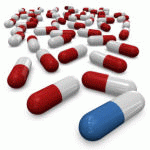Pharmacology
|
19 february 2019 08:00:03 |
| Marine Drugs, Vol. 17, Pages 122: Anti-Proliferation Activity of a Decapeptide from Perinereies aibuhitensis toward Human Lung Cancer H1299 Cells (Marine Drugs) |
|
Tweet Perinereis aibuhitensis peptide (PAP) is a decapeptide (Ile-Glu-Pro-Gly-Thr-Val-Gly-Met-Met-Phe, IEPGTVGMMF) with anticancer activity that was purified from an enzymatic hydrolysate of Perinereis aibuhitensis. In the present study, the anticancer effect of PAP on H1299 cell proliferation was investigated. Our results showed that PAP promoted apoptosis and inhibited the proliferation of H1299 cells in a time- and dose-dependent manner. When the PAP concentration reached 0.92 mM, more than 95% of treated cells died after 72 h of treatment. Changes in cell morphology were further analyzed using an inverted microscope and AO/EB staining and flow cytometry was adopted for detecting apoptosis and cell cycle phase. The results showed that the early and late apoptosis rates of H1299 cells increased significantly after treatment with PAP and the total apoptosis rate was significantly higher than that of the control group. Moreover, after treatment with PAP, the number of cells in the S phase of cells was significantly reduced and the ability for the cells to proliferate was also reduced. H1299 cells were arrested in the G2/M phase and cell cycle progression was inhibited. Furthermore, the results of western blotting showed that nm23-H1 and vascular endothelial growth factor (VEGF) protein levels decreased in a dose-dependent manner, while the pro-apoptotic protein and anti-apoptotic protein ratios and the level of apoptosis-related caspase protein increased in a dose-dependent manner. In conclusion, our results indicated that PAP, as a natural marine bioactive substance, inhibited proliferation and induced apoptosis of human lung cancer H1299 cells. PAP is likely to be exploited as the functional food or adjuvant that may be used for prevention or treatment of human non-small cell lung cancer in the future. |
| 61 viewsCategory: Biochemistry, Molecular Biology, Pharmacology |
 Marine Drugs, Vol. 17, Pages 123: Astaxanthin Ameliorates Lipopolysaccharide-Induced Neuroinflammation, Oxidative Stress and Memory Dysfunction through Inactivation of the Signal Transducer and Activator of Transcription 3 Pathway (Marine Drugs) Marine Drugs, Vol. 17, Pages 123: Astaxanthin Ameliorates Lipopolysaccharide-Induced Neuroinflammation, Oxidative Stress and Memory Dysfunction through Inactivation of the Signal Transducer and Activator of Transcription 3 Pathway (Marine Drugs)Marine Drugs, Vol. 17, Pages 121: 9-Methylfascaplysin Is a More Potent A? Aggregation Inhibitor than the Marine-Derived Alkaloid, Fascaplysin, and Produces Nanomolar Neuroprotective Effects in SH-SY5Y Cells (Marine Drugs) 
|
| blog comments powered by Disqus |
MyJournals.org
The latest issues of all your favorite science journals on one page
The latest issues of all your favorite science journals on one page



